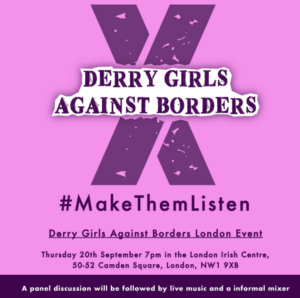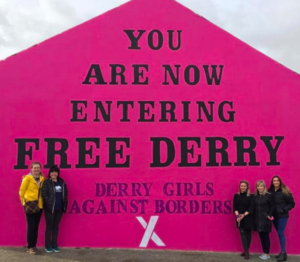Brexit can often feel like we’re trapped in our own peculiar version of Groundhog Day. Every day, although there may be some small change in tone or a new talking head on the TV, the debate remains essentially the same. The phony war has continued for two and a half years.
Over the summer, the question of the Irish border has risen up the agenda as the million dollar question. Pro-Brexit voices acknowledge it is the toughest nut to crack, and anti-Brexit voices know it is one of their strongest cards to play. The debate is set within this pattern: you either see it as your ace to play or deny it is a problem, and therefore it struggles to move beyond: “no physical infrastructure” versus a “technology-based solution”.

That’s why we came together to form Derry Girls Against Borders- an independent, grassroots campaign against a Brexit border. We wanted to reclaim the narrative around the border, to stop it being a technocratic issue to “solve” or a postscript to a debate. For us, the impact of Brexit isn’t a theoretical possibility but is already having an effect on our lives. It is talked about in living rooms and WhatsApp groups across Derry and beyond. Our questions have gone unanswered now for almost two anda half years.
Borders may define Northern Ireland’s geography, but my generation has built our lives over them to minimise their importance. Derry Girls become Donegal mammies, buying houses in Manorcunningham or Killea. Thousands of us – like me – move to other parts of the UK safe in the knowledge that Ryanair and Easyjet mean we’re only a short flight away. These choices are natural and uncomplicated, because there’s little to separate us, and no choice is irreversible.
Brexit risks jeopardising this new norm we all enjoy. The prospect of additional checks at the border or wider bureaucracy in our journeys will change the way we live our lives, byrestricting our choices and limiting the freedom we enjoy. Already three quarters of the people living in border regions say Brexit has had an impact on their lives.
As a London-Derry Girl, I am concerned that any changes to the East-West border or the border between Northern Ireland and the Republic of Ireland would be detrimental. Additional checks at airports or ports would add delay and complexity to journeys. Even worse, the type of issues under a no deal scenario- international driving licences, the return of mobile roaming charges, pet passports to take your dog to the beach- are almost laughably unfathomable.
Even more than the practical disruption is the emotional and symbolic effect. Any new Brexit borders will see Northern Ireland being even more “othered” from both the Republic of Ireland and Britain. For me, both Derry and London will become more distant and separate from each other from both vantage points.
I’ve lived in England on and off for over a decade now, and in that time I’ve seen a huge change in people’s understanding and awareness of Northern Ireland. I proudly bring friends home to walk the walls of Derry and get battered by the rain in the Giant’s Causeway. This new attitude is a direct result of free and easy travel, and an attitude that is warm and confident.
Any new border possesses a risk in undoing this change and could see Northern Ireland once again fall between two posts and considered neither here nor there. Compared to the progress made over the past two decades, this represents a significant step backwards.

Our campaign is simple: we want to be heard. We are a broad group of people with different politics, different identities and even different views on Brexit itself – but we are all united in opposing new borders. We want those involved in negotiations to deliver on the promises they have made, with clear and final answers. We know it’s hard. We know it’s the key to the rest of Brexit – but we deserve to be heard and we deserve answers.
Bronagh McCloskey is a Derry Girl currently living in London. Bronagh will be attending the ‘Derry Girls Against Borders’ London event, which will take place on Thursday 20th September 2018 at 7pm in the London Irish Centre. If you are interested please be sure to register your attendance in advance.
